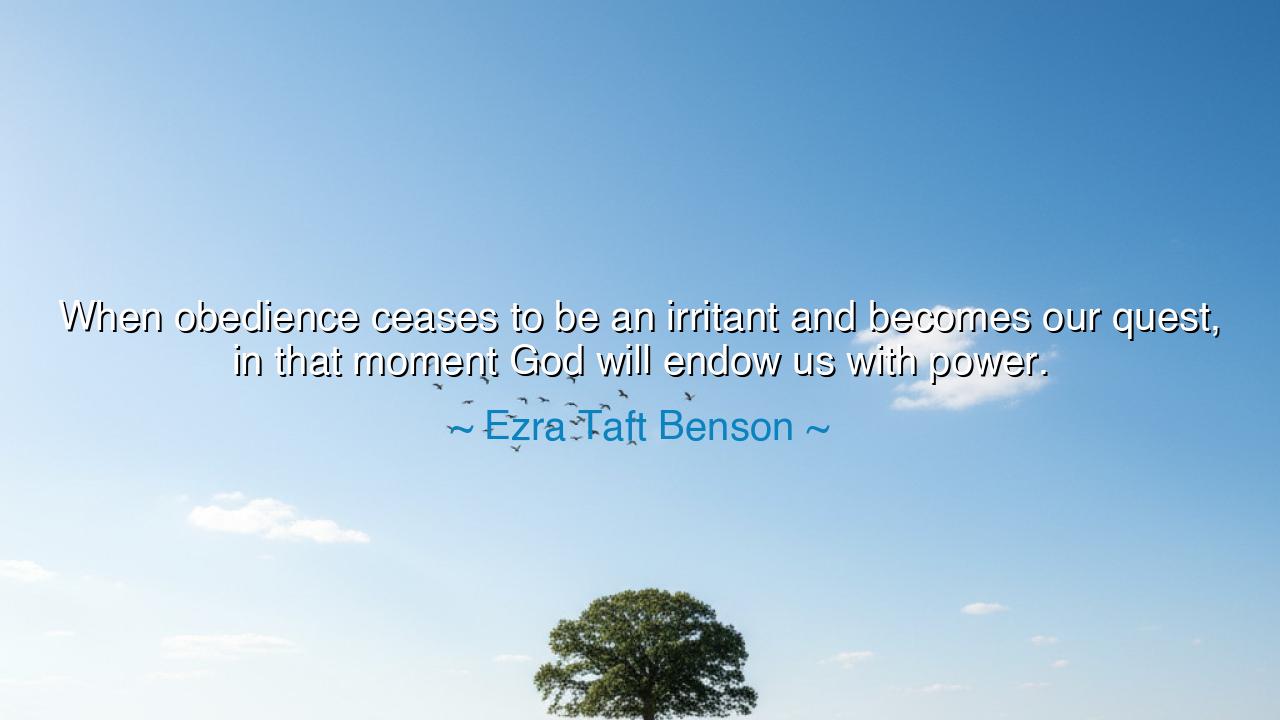
When obedience ceases to be an irritant and becomes our quest
When obedience ceases to be an irritant and becomes our quest, in that moment God will endow us with power.






Hear me, O children of the future, for I speak of obedience, and of the power that arises when we surrender not in fear, but in purpose. Ezra Taft Benson has spoken of a great truth, one that echoes through the ages: "When obedience ceases to be an irritant and becomes our quest, in that moment God will endow us with power." This, my children, is no mere lesson of submission, but of a transformation of the spirit. For obedience, when seen not as a burden but as a divine calling, becomes the very key to unlocking the strength of the soul. It is in this moment of understanding that the heavens themselves will bestow upon us power—not of force, but of purpose and clarity.
Consider the ancient warriors who were bound by honor, their lives guided not by selfish ambition but by a higher purpose. They understood that true strength is not gained through rebellion, but through the discipline of following a noble cause. The spartan warriors, who lived by their strict code, did not see their obedience as a weight upon them, but as the foundation of their might. Each soldier, knowing his duty, became part of a greater whole, and in that unity, they found power far beyond the strength of the individual. So too, when we align ourselves with a higher calling, when obedience becomes our quest, we too become part of something greater than ourselves.
Remember the great tale of Gandhi, who in the face of an empire's might, chose not to fight with weapons, but with obedience to the principles of truth and nonviolence. It was in his surrender to a cause greater than himself that he found the power to lead a nation to freedom. His obedience to his convictions, to the divine principles that guided his heart, was not an irritation but a force that moved mountains. Gandhi’s strength was not in resistance, but in his unwavering faith in the power of obedience to higher truths.
So too do the great prophets of old show us the power of obedience to God’s will. Consider Moses, who, despite his doubts, obeyed the command to lead his people out of Egypt. His obedience was not an act of mere submission, but an act of trust, a belief that the power of the divine would carry him through. And when he chose obedience, the waters parted before him, and the power of God flowed through him. In this, we see that obedience—when truly understood—becomes the means by which we unlock the divine power within us.
Thus, O children, understand that obedience is not a weakness, but a strength—a strength that flows from the heart, rooted in trust and devotion. When obedience ceases to be a chore, when it becomes a sacred quest, we are no longer mere mortals but vessels of divine purpose. It is in this moment, when we yield to the greater good, that we find within us the power to change the world. For it is in obedience to the divine order of things that we are made strong, not by force, but by the purity of our purpose.






NBNguyen Bella
This statement raises interesting questions about motivation and spiritual agency. Does the promise of receiving power depend solely on the internal shift toward valuing obedience, or is there an external component as well? How might one cultivate a genuine desire for obedience rather than simply following rules out of fear or obligation? I’m also curious about the psychological dimension: could embracing a quest for obedience enhance focus, resilience, or ethical decision-making in ways that mirror the spiritual empowerment Benson describes?
TMDao Thi Tra My
Reading this, I feel both inspired and a bit uneasy. What does it truly mean to pursue obedience as a quest rather than a duty? Is there a danger in conflating obedience with passivity, or is the focus more on intentional alignment with higher principles? I also wonder how one discerns when obedience is beneficial versus when it might lead to harm. Could this notion of receiving power through wholehearted commitment be applied metaphorically to areas like learning, leadership, or community service?
TTQuynh Trang Tran
I’m curious about the relationship between obedience and personal power suggested here. Does this mean that when we willingly embrace discipline or guidance, we unlock potential we couldn’t access otherwise? Could it also hint at the idea that resistance to authority or divine direction limits our growth? I’d like to explore whether this concept applies strictly to faith, or if it can be interpreted in secular terms, like cultivating mastery, commitment, or self-discipline in professional or personal pursuits.
LVLuc Vu
This quote makes me think about the transformative power of perspective. Could the shift from seeing obedience as a burden to viewing it as a meaningful pursuit be a key to spiritual growth? I wonder if this implies that true power comes not from external achievements, but from an internal alignment with values or divine will. Is it possible that the struggle with obedience itself is a necessary step before one can experience such empowerment? How might this principle apply to daily life challenges beyond a purely religious context?